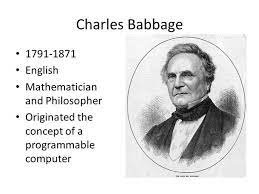Charles Babbage – The Father of Computers
Charles Babbage is widely regarded as the Father of Computers. His visionary ideas and groundbreaking inventions laid the foundation for modern computing. In this article, we will explore the life and contributions of Charles Babbage, his inventions, and the impact he has had on the field of computer science.

Why this News is Important:
Understanding the Origins:
For students preparing for government exams, knowing the historical context of computing is crucial. Charles Babbage’s contributions provide insights into the evolution of computers, helping candidates grasp the foundations of modern technology.
Impact on Computer Science:
Babbage’s inventions paved the way for the development of computers as we know them today. His ideas and concepts continue to influence computer science and technology, making this news significant for those aiming for positions related to computers, technology, and information systems.
Exam Relevance:
Charles Babbage and his inventions often find mention in exams for various government positions, including civil services, banking, and defense. Familiarity with Babbage’s work can enhance candidates’ understanding of the subject matter and increase their chances of scoring well.
Historical Context:
Charles Babbage was born on December 26, 1791, in London, England. During the 19th century, the Industrial Revolution brought about significant advancements in various fields. It was during this period that Babbage’s ideas started taking shape, revolutionizing the world of computing.
Babbage’s Inventions:
The Difference Engine: One of Babbage’s notable inventions was the Difference Engine. It was a mechanical device designed to perform complex mathematical calculations. The machine used a series of gears and levers to automate calculations, eliminating the risk of human error.
The Analytical Engine: Babbage’s most significant invention was the Analytical Engine, which can be considered the precursor to modern computers. It was designed to perform not only mathematical calculations but also logical operations. The Analytical Engine featured memory, a control unit, and even had the concept of loops and conditional branching.
Key Takeaways from “Charles Babbage – The Father of Computers”:
| Serial Number | Key Takeaway |
|---|---|
| 1 | Charles Babbage is widely known as the Father of Computers. |
| 2 | Babbage’s inventions include the Difference Engine and the Analytical Engine. |
| 3 | The Difference Engine was a mechanical device for mathematical calculations. |
| 4 | The Analytical Engine was a precursor to modern computers, with features like memory and logical operations. |
| 5 | Babbage’s contributions are crucial for understanding the evolution and impact of computing technology. |
Important FAQs for Students from this News
Q: What are the significant contributions of Charles Babbage to the field of computing?
A: Charles Babbage is known for inventing the Difference Engine and the Analytical Engine, which laid the foundation for modern computers. His ideas revolutionized the field of computing and led to advancements in mathematical calculations and logical operations.
Q: How did Charles Babbage’s inventions impact the development of computers?
A: Babbage’s inventions, particularly the Analytical Engine, introduced concepts like memory, control units, and conditional branching, which are fundamental to modern computers. His work formed the basis for subsequent technological advancements in computer science.
Q: Why is Charles Babbage referred to as the Father of Computers?
A: Charles Babbage’s innovative ideas and inventions marked a significant milestone in the history of computing. His pioneering work laid the groundwork for the development of computers and the field of computer science as a whole, earning him the title of the Father of Computers.
Q: In which exams is knowledge of Charles Babbage and his inventions relevant?
A: Knowledge of Charles Babbage and his inventions is relevant in various government exams, including civil services, banking, defense, and positions related to technology and information systems.
Q: How can familiarity with Charles Babbage’s work benefit students preparing for government exams?
A: Understanding Charles Babbage’s contributions helps students grasp the historical context of computing, enhances their knowledge of the subject matter, and increases their chances of scoring well in exams that include questions on computer science and technology.
Some Important Current Affairs Links

















